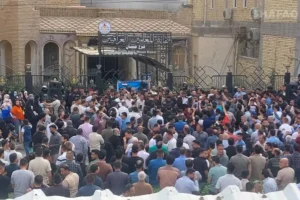
A 31-year-old finally having his bar mitzvah sounds like a throwaway joke in a Netflix rom-com. In “31 Candles,” it’s the whole point.
The film follows Leo Kadner, a Jewish New York director who spends his days making straight-to-streaming Christmas movies, until a run-in with his former camp crush inspires him to mark adulthood — and his Jewish identity — with a wildly belated bar mitzvah. Loosely inspired by writer-director-star Jonah Feingold’s own life, the movie leans into New York autumnal vibes, Jewish family neuroses, and the utter chaos of situationships, exes, and mitzvah projects.
Unpacked chatted with Feingold and the film’s producers, Jonah Weinstein and Hannah Welever, about how “31 Candles” became Feingold’s most personal movie yet, why Jewish joy and ritual make such rich rom-com material, and what it means to “come of age” when you’re already well into your thirties.
“31 Candles” is a new interpretation of what coming-of-age means
In the past few years, there’s been a slew of new b’nei mitzvah movies, from “You Are So Not Invited to My Bat Mitzvah” to adult bat mitzvah dramedy “Between the Temples,” to Scarlett Johansson’s directorial debut, “Eleanor the Great.” Filmmakers keep returning to this ritual not just for the spectacle of speeches and hora circles, but for what it reveals about family dynamics, insecurity, and the complicated ways Jews grow into — or away from — their identities.
Related Post: The best bar and bat mitzvah movies, ranked
“31 Candles” blends the coming-of-age of a bar mitzvah with the second-chance romance of a rom-com when Leo runs into his childhood crush, Eva Shapiro (Sarah Coffey), a struggling actress who teaches b’nei mitzvah classes on the side. Leo, who hadn’t seen her in over 15 years, falls right back in love and decides to become a bar mitzvah in hopes of wooing her.
Feingold sees the bar mitzvah at the heart of “31 Candles” as more than just a funny premise: it’s the key to the film’s emotional stakes.
“A bar mitzvah is the perfect example of a coming of age,” he said. Leo, Feingold explained, doesn’t fully feel like an adult, “maybe because he hadn’t had one, maybe because he was still sort of not committing to somebody from a level of like falling in love.”
Jonah Feingold in “31 Candles”
For Feingold, all the thematics that surround a bar mitzvah — standing in front of your community, owning your choices, deciding who you want to be — are “great for a 13-year-old, but it’s also really applicable to anybody at any point in their life that wants some sort of change.” As he put it, it’s never too late to explore what it means to grow up, and then decide “if that’s something that you want or not.”
Weinstein added that for Feingold, “31 Candles” became an opportunity to explore Judaism and become a bar mitzvah in real life.
“Jonah Feingold didn’t have a bar mitzvah as a teenager, so he was treating this movie as his bar mitzvah,” he said. When Feingold read from the Torah in the film, Weinstein explained, it was his first time, and when the crew lifted him on a chair during the hora at the bar mitzvah party, it became a special moment for everyone to celebrate.
Feingold’s “film family” and his real family were both in attendance to witness the milestone: his parents came to the set for the bar mitzvah scene and even appeared as extras. Weinstein described watching them “sobbing” as their son completed this experience and led a set of dozens: “he was the captain of the ship, and it was his Jewish passage as a Jewish man.”
“31 Candles” is inspired by Jonah Feingold’s experiences
“31 Candles” poster
Feingold got the idea for “31 Candles” after finishing “ExMas” with Leighton Meester and Robbie Amell; he decided to create a movie that resonated more with his own experiences and identity.
Having built a mini-portfolio of glossy, streaming-era holiday fare, Feingold is very aware of the irony that his most personal project is the one where he finally pivots from Christmas to the Jewish ritual he skipped in real life.
“It was really fun to make a Christmas rom-com, but I wanted to go in more personally and figured out a way to make a movie that was about my family and about my Jewish upbringing, that still incorporated some of that fun commercial joy that comes with the Christmas rom-coms, but that feels personal,” he said.
For Feingold, that shift isn’t just about swapping Christmas trees for kiddush cups — it’s about claiming space for the kind of story he wasn’t seeing on screen.
“I don’t see enough feel-good Jewish rom-coms out there,” he said, adding that as someone single and living in New York, he felt he should be the one to make one. With “31 Candles,” he leaned all the way into that gap: a cozy, self-aware rom-com that lets Jewish ritual, family neurosis, and romantic chaos coexist in the same frame.
It was the combination of an adult bar mitzvah and the rom-com genre that immediately convinced Weinstein and Welever to sign onto the film.
Welever said she knew “31 Candles” was special from the first read. In an industry where she’s constantly sifting through scripts, “you rarely read something and you can, like, see it perfectly, and you go, like, this would be a great film.” With “31 Candles,” she “breezed through it” and immediately thought, “I would love to make this. I felt like Jonah’s character is so likable and relatable.”
“31 Candles” continues the legacy of the Jewish rom-com
Leo’s experience chasing after Eva was inspired by Feingold reconnecting with his own childhood summer camp crush — someone he’d long idealized and romanticized — and the process of simply becoming friends with them as an adult.
“It’s a movie about young love, about when you’re 13 and you share an iPod with somebody, and there’s that song that immediately takes you back,” he said. “I’m 35 now, and if I listen to ‘Hey There Delilah,’ I am instantly transported back to my younger self. I think that’s what I wanted to tap into. There’s this really powerful concept that is almost like a time machine. And here’s a character who’s obsessed with that.”
Jonah Feingold and Sarah Coffey in “31 Candles”
Feingold is very consciously working in a tradition that runs from Billy Wilder and Howard Hawks to Woody Allen and Nora Ephron, and “31 Candles” wears those influences on its sleeve. The film has Allen’s neurotic, self-questioning New York writer at its center — complete with talky, self-deprecating asides and meandering walks through the city — but it’s filtered through Ephron’s softer, more romantic lens, where New York is bathed in golden light, friends and family function as a noisy chorus, and big emotional beats play out in cozy apartments and small bars.
Welever said, as a rom-com, “31 Candles” fits naturally into Feingold’s ongoing obsession with modern romance in New York, especially for single thirtysomethings. She pointed to the sequence of Leo cycling through different dates at the same bar as a distilled version of what dating in the city feels like: a “constant search” that’s funny, bittersweet and quietly hopeful all at once. For her, the film’s power is that it isn’t really about “getting the girl” or a tidy happily-ever-after, but about the trial-and-error of connection and, ultimately, a main character who doesn’t end up with a person so much as he ends up more fully with himself.
How New York defines “31 Candles”
Outside of film, Feingold pulls from a pretty eclectic set of inspirations. He described how much he loves going to the Metropolitan Museum of Art, where “every room is different, but it’s all still art,” and how that informs his own willingness to mix tones and genres in a single movie — like Monet hanging next to Egyptian artifacts, “different genres existing in the same space.”
He’s equally shaped by New York itself, especially the Upper West Side and modern dating culture, and, as he put it, “the idea of romanticizing and being delulu.” On top of that, he folds in lyrics from the emo and pop-punk he grew up on, plus his love of Broadway and musical theater. All of it, he said, contributed to the melting pot that eventually became “31 Candles.”
Jonah Feingold and Sarah Coffey in “31 Candles”
For Feingold, centering the movie in New York, almost to the extent that it serves as a character in the film, felt essential to the story. As a small-budget film, he admitted that the production couldn’t be filmed anywhere other than the city where he lives. However, his status as a native New Yorker allowed him to explore the city and utilize it well.
“New York is one of the most romantic cities in the world, and it’s one of the most interesting cities to film in, because anywhere you point the camera, you’re going to get something interesting,” he said. “It’s just incredibly inspiring.”
Having recently moved to New York, Welever trusted Feingold’s instincts and was excited by the idea of “making a feature in New York in the fall,” an ambitious shoot with very specific locations that felt both beautiful and challenging. Looking back, she said, “I’m just really proud of how it turned out. I think we all really crushed it.”
Creating authentic Jewish representation
Unlike many other Jewish films, “31 Candles” dives deep into Judaism. The actors pray, sing, and authentically engage in Shabbat dinner in a way rarely seen on the silver screen.
Feingold admits that making such an overtly Jewish film felt both exciting and a little daunting. Part of that was simply how immersive it became: he “very much learned Hebrew through the process of making the film” and found himself “reminded of my Jewish roots.” A lot of what he had absorbed as a kid had faded, and “31 Candles” became a chance to “re-explore the lens of the religion,” a process that naturally made its way onto the screen.
Sarah Coffey in “31 Candles”
At the same time, he stressed that the movie isn’t narrowly sectarian. By going so deep into Jewish ritual and identity, he also made room for other touchstones: there are Christmas scenes, and at one point, Leo even says “Merry Christmas” on the day of his bar mitzvah. Feingold hopes audiences see that blend as “a diverse mix of perspective,” a story grounded in Jewish specificity that still feels open and inviting to everyone.
Weinstein, whose own Jewish short film “The Eighth Day” is currently on the festival circuit, loved that “31 Candles” told a Jewish story centered on love, family, and simchas. His north star on “31 Candles” was “Jewish joy and Jewish stories. … It’s a religion of love and community and joy.”
Having grown up in Jewish day school and Jewish camp, Weinstein has thought a lot about Jewish ideas and identity and believes it’s important “to continue to interrogate… Jewish text and Jewish culture and representation.”
He explained how “there are a lot of different ways to be Jewish and to feel Jewish and to practice your Judaism,” and how he wanted to represent the diversity of the Jewish people and Jewish storytelling.
In Hollywood, he noted, characters can easily slide into caricatures, which can sometimes be useful shorthand, “but in ‘31 Candles,’ we tried to be very thoughtful about what it means to be an Upper West Side Jewish New Yorker,” grounding everything in Feingold’s real experiences and imagined conversations with his late grandmother. “We really wanted to ground it in the reality and specificity of his experience,” he said, adding that while the film “is a very Ashkenazi New York story… There are many, many more Jewish stories to be told.”
A unique creative process
Feingold is candid about the fact that there’s “a level of self-indulgence” in writing, directing, and starring in the same movie. After coming off a project with “a lot of personal cooks in the kitchen,” he said he wanted “31 Candles” to be different: fewer decision-makers, a more personal feel. As he put it, he “just wanted to make it” without things getting in the way.
Having all those titles, he explained, mostly means he can “control the tempo and the energy on set” and avoid “the usual nonsense that happens in the system” by keeping things transparent, kind, and collaborative.
Jonah Feingold in “31 Candles”
That extended to the lead role, which he had always envisioned himself playing, though he admitted there was one day he considered getting Alex Edelman or “someone cool in the Jewish film world” to portray Leo.
“Then I was like, ‘No, this is a movie about me and my grandma,’” he said. There were practical considerations — “I don’t cost any money” — but also tonal ones: “I’m also not going to give myself any pushback. I’m down to fall on a banana peel and have people laugh at me. I don’t know if every actor is down for that.”
At the same time, he stressed how supported he felt on set, crediting a great team of producers and a fantastic cinematographer and assistant director, who helped him manage the many hats he was wearing.
The hardest part, he added, wasn’t the filmmaking itself, saying “the movie part was incredibly easy,” but rather everything that has come after: trying to make a splash in a crowded media landscape and getting people “to show up to a theater and understand the importance of going to a theater.”





